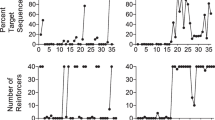Abstract
The experiment reported here represents a partial replication of an experiment by Newman, Buffington, and Hemmes (in press) and analyzes responding in college students as a function of three different schedules of reinforcement (FR 1, FR 2, FR 3) and either verbal discriminative stimuli (instructions) or nonverbal discriminative stimuli (different colored cards). All consequences (tokens) were based on behavior consistent either with the verbal discriminative stimulus (SD) or with the nonverbal SD. The schedule of reinforcement varied across subjects, and accuracy of the verbal and nonverbal SDs varied across phases from. Results showed that the behavior of all continuous reinforcement (FR 1) subjects was sensitive to the accuracy of the verbal SDs, but the behavior of subjects in the nonverbal SD conditions showed more sensitivity than the behavior of subjects in verbal conditions under intermittent schedules (FR 2 and FR 3). These findings suggest that the behavior of subjects in experiments where instructions are sometimes pitted against actual contingencies of reinforcement is a function not only of the instruction, but also of the type of reinforcement schedule used.
Similar content being viewed by others
References
Baron, A., & Galizio, M. (1983). Instructional control of human operant behavior. The Psychological Record, 33, 495–520.
Buskist, W. F., Bennett, R. H., & Miller, H. L. Jr. (1981). Effects of instructional constraints on human fixed-interval performance. Journal of the Experimental Analysis of Behavior, 35, 217–225.
Cerutti, D. A. (1991). Discriminative versus reinforcing properties of schedules as determinants of schedule insensitivity in humans. The Psychological Record, 41, 51–67.
DeGrandpre, R. J., & Buskist, W. F. (1991). Effects of accuracy of instructions on human behavior: Correspondence with reinforcement contingencies matters. The Psychological Record, 41, 371–384.
Galizio, M. (1979). Contingency-shaped and rule-governed behavior: Instructional control of human loss avoidance. Journal of the Experimental Analysis of Behavior, 31, 53–70.
Hayes, S. C., Brownstein, A. J., Haas, J. R., & Greenway, D. E. (1986). Instructions, multiple schedules, and extinction: Distinguishing rule-governed from schedule-controlled behavior. Journal of the Experimental Analysis of Behavior, 46, 137–147.
Hayes, S. C., Brownstein, A. J., Zettle, R.D., Rosenfarb, I., & Korn, Z. (1986). Rule-governed behavior and sensitivity to changing consequences of responding. Journal of the Experimental Analysis of Behavior, 45, 237–256.
Higgins, S. T., & Morris, E. K. (1984). Generality of free-operant avoidance conditioning to human behavior. Psychological Bulletin, 96, 247–272.
Joyce, J. H., & Chase, P. N. (1990). Effects of response variability on the sensitivity of rule-governed behavior. Journal of the Experimental Analysis of Behavior, 54, 251–262.
Kaufman, A., Baron, A., & Kopp, R.E. (1966). Some effects of instructions on human operant behavior. Psychonomic Monograph Supplements, 1, 243–250.
Lippman, L. G., & Meyer, M. E. (1967). Fixed-interval performance as related to instructions and subjects’ verbalizations of the contingency. Psychonomic Science, 8, 135–136.
Matthews, B. A., Catania, A. C., & Shimoff, E. (1985). Effects of unistructed verbal behavior on nonverbal responding: Contingency descriptions versus performance descriptions. Journal of the Experimental Analysis of Behavior, 43, 155–164.
Matthews, B. A., Shimoff, E., Catania, A. C. & Sagvolden, T. (1977). Uninstructed human responding: Sensitivity to ratio and interval schedules. Journal of the Experimental Analysis of Behavior, 27, 453–467.
Newman, B., Buffington, D. M., & Hemmes, N. S. (in press). Insensitivity to reinforcement as a function of schedule of reinforcement. The Psychological Record.
Newman, B., Buffington, D. M. & Hemmes, N. S. (1991). Maximization of reinforcement by two autistic students with accurate and inaccurate instructions. The Analysis of Verbal Behavior, 9, 41–48.
Reese, H. W. (1989). Rules and rule-governance: Cognitive and behavioristic views. In S. C. Hayes (Ed.), Rule-governed behavior: Cognition, contingencies, and instructional control (pp. 3–84). New York: Plenum Press.
Shimoff, E., Catania, A. C., & Matthews, B. A. (1981). Uninstructed human responding: Responsivity of low-rate performance to schedule contingencies. Journal of the Experimental Analysis of Behavior, 36, 207–220.
Shimoff, E., Catania, A.C., & Matthews, B.A. (1986). Human operant performance: Sensitivity and pseudosensitivity to contingencies. Journal of the Experimental Analysis of Behavior, 46, 149–157.
Weiner, H. (1970). Instructional control of human operant responding during extinction following fixed-ratio conditioning. Journal of the Experimental Analysis of Behavior, 13, 391–394.
Author information
Authors and Affiliations
Rights and permissions
About this article
Cite this article
Newman, B., Hemmes, N.S., Buffington, D.M. et al. The effects of schedules of reinforcement on instruction-following in human subjects with verbal and nonverbal stimuli. Analysis Verbal Behav 12, 31–41 (1995). https://doi.org/10.1007/BF03392895
Published:
Issue Date:
DOI: https://doi.org/10.1007/BF03392895




